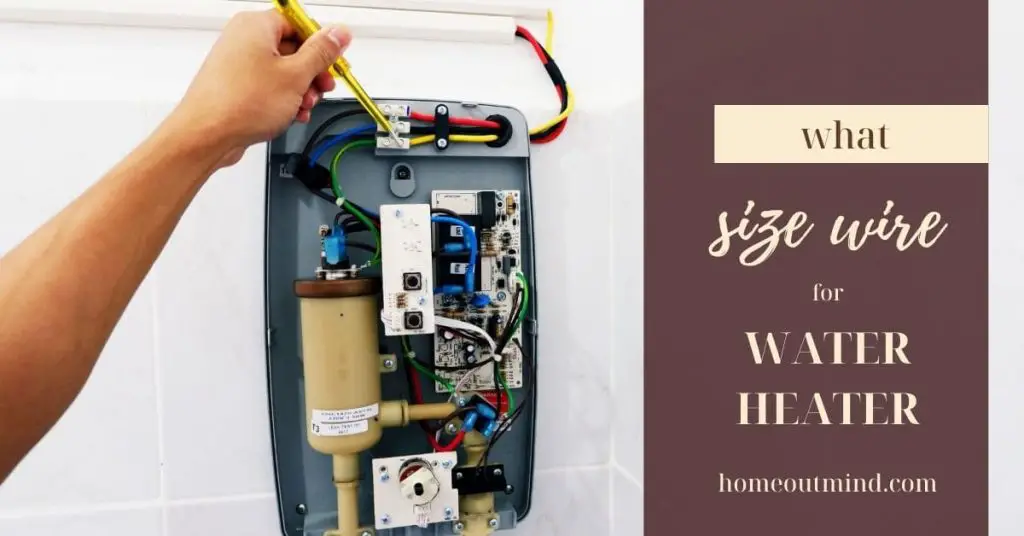When it comes to installing or replacing a water heater, selecting the appropriate wire size is crucial to ensure safe and efficient operation. The wire size is determined by factors such as the heater’s voltage, current rating, and distance from the electrical panel.
Here’s a comprehensive guide to help you determine the correct wire size for your water heater:

1. Determine Voltage and Current Rating:
- Voltage: Most residential water heaters operate at either 120 volts or 240 volts. Verify the voltage rating of your water heater before proceeding.
- Current Rating: Check the manufacturer’s specifications or the rating plate on the water heater to find the current (amperage) requirement. This information is essential for selecting the appropriate wire gauge.
2. Calculate the Required Wire Size:
- Use the current rating of the water heater to determine the minimum wire size needed to safely carry the load without overheating.
- Consult the National Electrical Code (NEC) or local building codes for guidance on wire size selection based on current ratings and application.
3. Consider Distance and Voltage Drop:
- Longer wire runs and voltage drops can affect the performance of your water heater. Factor in the distance between the electrical panel and the water heater when selecting the wire size.
- Voltage drop can lead to inefficient operation and potential damage to the water heater. Use voltage drop calculators or consult electrical codes to ensure compliance.
4. Choose the Appropriate Wire Gauge:
- Refer to wire size charts provided by electrical code authorities or reputable sources to select the correct gauge for your water heater installation.
- For 120-volt water heaters, common wire sizes may range from 14 AWG to 10 AWG, depending on the current rating and distance.
- For 240-volt water heaters, wire sizes typically range from 12 AWG to 8 AWG for residential applications.
5. Seek Professional Guidance if Unsure:
- If you’re uncertain about the appropriate wire size or installation requirements, consult a licensed electrician or electrical inspector for assistance.
- Ensure compliance with local building codes and regulations to guarantee safety and prevent potential hazards.
What Size Wire Do I Need for a 4500-Watt Water Heater?
When it comes to powering a 4500-watt water heater, selecting the correct wire size is crucial for safety and efficiency. Here’s a quick guide to help you determine the appropriate wire gauge:
1. Calculate Amperage:
To find the amperage, divide the wattage of the water heater (4500 watts) by the voltage it operates on. For most residential water heaters operating at 240 volts:
- Amperage = 4500 watts / 240 volts ≈ 18.75 amps
Can I Use 2.5 mm Cable for a Water Heater?
Using a 2.5 mm cable for a water heater may not be sufficient, especially for higher voltage or wattage units.
It’s crucial to consult the manufacturer’s specifications and local electrical codes to ensure safety and compliance.
Generally, larger gauge wires are recommended for water heaters to handle the load and prevent overheating or electrical hazards.
Can I Use 1.5 mm Cable for a Water Heater?
Using a 1.5 mm cable for a water heater is not advisable due to its limited capacity to handle the electrical load.
Water heaters typically require thicker gauge wires to accommodate their voltage and current requirements safely. Using undersized cables can lead to overheating, voltage drop, and potential safety risks.
It’s essential to select the appropriate wire size based on the water heater’s specifications and electrical codes.
Can You Use 12 2 Wire for a Water Heater?
While 12-2 wire may be suitable for certain applications, it may not be adequate for a water heater, especially if it’s a 240-volt unit. Water heaters typically require heavier gauge wires to handle the higher voltage and current demands safely.
Using the correct wire size is crucial for preventing overheating, voltage drop, and electrical hazards. Refer to the water heater’s specifications and consult electrical codes for guidance on wire selection
What size breaker do I need for a 220v hot water heater?
To determine the appropriate breaker size for a 220V hot water heater, you need to consider the voltage, wattage, and electrical code requirements. Generally, for a 220V hot water heater, you’ll need a breaker rated at or slightly above the amperage required by the heater.
Check the manufacturer’s specifications for the amperage rating of your water heater and choose a breaker accordingly. For example, a 4500-watt heater at 220V typically requires a 20-amp breaker to ensure safe operation.
What is the load capacity of 1.5 mm wire?
The load capacity of 1.5 mm wire, commonly referred to as 14 AWG wire, depends on various factors such as the material, insulation type, and local electrical codes.
Generally, 1.5 mm wire can safely handle currents ranging from 10 to 15 amps. However, it’s essential to consult local electrical codes and regulations to ensure compliance and safety when using 1.5 mm wire for specific applications.
Can I use 10 3 wire for a hot water heater?
The use of 10 3 wire for a hot water heater depends on the electrical requirements and local building codes. “10 3 wire” typically refers to a cable with three 10-gauge conductors and a ground wire.
This type of wire is commonly used for 240-volt circuits, which may be suitable for some hot water heaters. However, it’s crucial to verify that the wire is rated for the voltage and amperage requirements of your water heater and comply with local electrical codes.
Consult a qualified electrician or refer to the manufacturer’s specifications for guidance on using 10 3 wire for your hot water heater installation.
Frequently Asked Questions:
How to replace a thermocouple on a gas water heater
Replacing a faulty thermocouple on a gas water heater is essential if the pilot light won’t stay lit. Start by turning off the gas supply and pilot light.
Remove the old thermocouple from the control valve and install the new one, ensuring it’s securely attached. Relight the pilot light according to manufacturer instructions.
For detailed replacement steps and troubleshooting tips, explore our article on How to Replace a Thermocouple on a Gas Water Heater.
How to fix a water heater pilot light
Fixing a water heater pilot light is a manageable task with the right approach. Start by turning the control knob to “Pilot” and holding it while igniting the pilot light. If the light doesn’t ignite, wait 10 minutes before trying again.
Check for loose connections or faulty components, such as the thermocouple or gas supply.
For detailed troubleshooting steps and safety precautions, explore our comprehensive guide on How to Fix a Water Heater Pilot Light.
How to install hot water heater element
Installing a hot water heater element requires precision and attention to detail. Start by turning off the power and draining the tank partially.
Remove the access panels, disconnect the old element, and install the new one securely. Reconnect the wires and ensure proper alignment to prevent leaks.
For step-by-step instructions and safety tips, refer to our comprehensive guide on How to Install a Hot Water Heater Element.
How to turn up hot water heater electric
Adjusting the temperature on an electric hot water heater is straightforward. Locate the thermostat panel, remove the cover, and adjust the temperature dial to your desired setting.
Remember to consider energy consumption and the risk of scalding. For detailed instructions and temperature adjustment tips, consult our guide on How to Turn Up an Electric Hot Water Heater.
How to test a water heater element
Testing a water heater element is crucial for ensuring efficient operation. Start by turning off the power and draining the tank partially.
Disconnect the wires from the element and use a multimeter to measure the resistance. Compare the reading to manufacturer specifications to determine if the element is functioning correctly.
For a thorough guide on testing procedures and troubleshooting tips, explore our article on How to Test a Water Heater Element.
Final Verdict
Selecting the correct wire size for your water heater is essential for safe and efficient operation. Consider the voltage, current rating, distance, and voltage drop when determining the appropriate wire gauge.
Prioritize safety by adhering to electrical codes and seeking professional assistance if needed. By choosing the right wire size, you can ensure reliable performance and peace of mind with your water heater installation.

